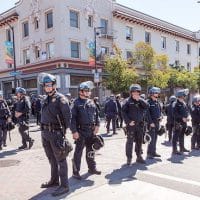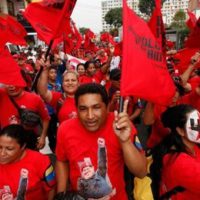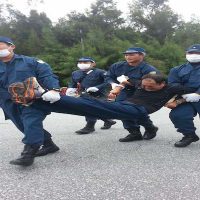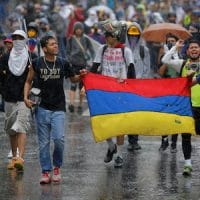-
Reiterating Mao on December 26, his birth anniversary
Reiterating Mao’s teachings is one of the essentials in the area of political education as a new generation is joining people’s struggle.
-
Power to the People: In Italy, Potere al Popolo, a new left-wing movement is born
The meeting, attended by thousands of people, was thrilling and inspiring; all Italian communist parties and organisations, as well as environmentalist groups, social and community centres and workers associations took part in it.
-
Capitalism’s life source: the domestic and social basis for exploitation
Social reproduction theory (SRT) sounds quite intimidating, but the (rather grandiose) anthology of big words masks a relatively simple question: if capitalist production is fundamentally the production of commodities, and it is workers who produce such commodities, who ‘produces’ the worker?
-
Alain Badiou debates reformist Laurent Joffrin
Alain Badiou is former chair of philosophy at École normale supérleure and author of In Praise of Politics. Laurent Joffrin is editor of Libération newspaper—and a reformist who defends existing social democracy. Alain Badiou recently announced that he would stop running his seminar. He also announced that he would soon be publishing The Immanence of Truths, completing […]
-
Capitalism, exterminism and the long ecological revolution
teleSUR spoke to Monthly Review editor John Bellamy Foster about climate change & the need to fight for an ecosocialist, revolutionary alternative to the profit-driven world capitalist system.
-
Concrete utopia
Where is Utopia today? Is this question relevant? One might argue that the term utopia is incongruous with the politics of our time, to say the least. Not only does the term ‘utopia’ indicate no place, when it found a place, it was mistreated and mutilated. What would be the place for utopian thinking in a world that is desperate to solve the accrued problems that it has created for itself? Would utopian thinking distract us from the real tribulations besetting the world?
-
Yemen: A western-sponsored genocide
The lack of media interest makes it seem like a crisis unfolding in slow motion. But that is only because outrage and compassion are now meant to be weaponised when they can be useful in justifying imperialist interventions. For the Yemeni people the agony is real and there is no escaping it.
-
Poll finds growing demand for reform in Russia
According to a survey by the Russian Academy of Sciences, 51% of Russians believe the country needs “significant reform” over “stability.” Though a small majority, that’s the first time “reform” has won out since before 2003, perhaps indicative of a changing political mood locally. Per the polling, the younger generation is the most pro-reform, with 62% in favor.
-
Debt comes for us all
“DON’T LET YOUR CHILDREN GO INTO CRIPPLING DEBT LIKE I HAVE!” I shout, as I and a group of students with SENS-UAW make our way to a major intersection just off Union Square. We wave signs, hoist our banner and merge into the crowd. We are protesting the new GOP tax bill, which will affect the lives of current, previous, and prospective students in critical and long-lasting ways.
-
Net neutrality and the socialist moment
In recent months, one of the United States’ most important debates has revolved around the broad concept of Net Neutrality (NN). Without delving into the technicalities, the concept of NN is that internet service providers (ISPs) cannot privilege or restrict internet data. Basically, once you’ve purchased your internet package with the requisite bandwidth parameters, your ISP cannot make your access to a certain site easier or harder, faster or slower.
-
Employers would pocket $5.8 billion of workers’ tips under Trump administration’s proposed ‘tip stealing’ rule
On December 5, the Trump administration took its first major step toward allowing employers to legally pocket the tips earned by the workers they employ. The Department of Labor (DOL) released a proposed rule that would allow restaurants to take the tips that servers earn and share them with untipped employees such as cooks and dishwashers.
-
A revolutionary voice for women’s freedom available in English for the first time
Liz Payne reviews The Woman Worker by Nadezhda K Krupskaya.
-
Evgeny Pashukanis: Commodity-form theory of law
Whether one believes that law is provided by God (Natural Law), is created by human intellect (Positivism), a gendered institution perpetuating patriarchy (Feminism) or the maintainer of the status quo against marginalised groups (Critical Legal Studies), undergirding those beliefs is the assumption that law is autonomous.
-
Limits on free speech
Judith Butler asks what happens when free speech clashes with other basic values.
-
Trump’s thug-power, or does anybody still like Woody Allen?
Let’s go back to when we were all a little younger and less terrified. Obama is president. I am talking to a slightly older, white, heterosexual male, highly esteemed by the academic world and by me. I, a lesbian, admire and trust this guy. We’re catching up, talking about life, books, friends. I tell him my friend Beth is having a hard time writing her memoir. She’s trying to decide if she should include the fact that her very famous father, a renowned attorney, had sexually molested her for years while she was growing up.
-
Chavismo virtually wipes U.S.-backed opposition from municipal map
This is the worst electoral defeat for the opposition in Venezuela since 2005.
-
Honduras in flames
The chaos surrounding last week’s presidential elections in Honduras reflects a rightwing consolidation of power in the country, abetted by the United States.
-
A lifetime opposing the U.S. military on Okinawa
There are eighty of us sitting down, linking arms, blocking the gates of a US military base. Private security guards are lined up behind us, while men in uniform film us from behind barbed-wire fences. Suddenly, Japanese police officers pile out of their vans in their dozens. They grab a protester, a woman in her seventies. She goes limp and screams “US bases out of Okinawa!” as they carry her away.
-
As ‘epic winds’ drive California fires, climate change fuels the risk
Santa Ana winds are whipping up wildfires in Southern California after a devastating season in wine country. Rising temps can make the West dangerously combustible.
-
WaPo’s one-sided cheerleading for coup and intervention in Venezuela
The Washington Post has put out 15 opinion pieces on issues surrounding Venezuela, and they are disturbing and far from the truth.

![Mao Tse-tung [also spelled Mao Zedong]](https://mronline.org/wp-content/uploads/2017/12/mao-zedong-31-200x200.jpg)
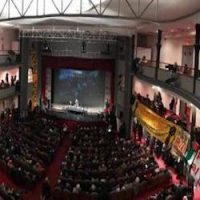



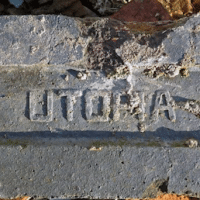
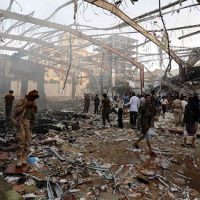
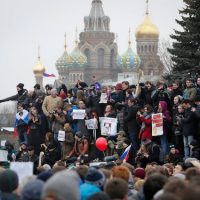
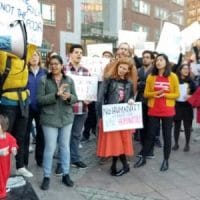


![Monument to the Unknown Woman Worker [Cork Artist Louise Walsh]](https://mronline.org/wp-content/uploads/2017/12/17718587674_edb6e21c68_b-200x200.jpg)

